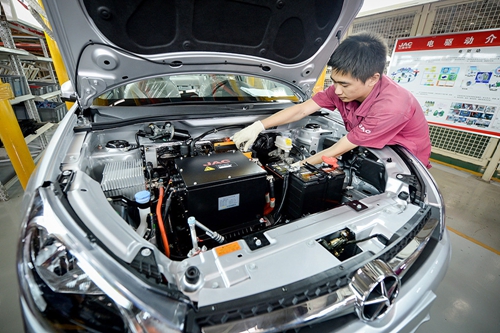By Professor Shi Shiwei, Director of European Studies Department, Regional and National Studies Institute, University of International Business and Economics
On June 12, Chinese Premier Li Keqiang held talks with German Chancellor Angela Merkel at the 4th round of Sino-German government consultations, marking her ninth visit to China.

Beijing and Berlin have strengthened economic and trade cooperation based on win-win concepts. Chinese enterprises have purchased some German high-tech companies, which has caused some discordant voices in Germany. Nevertheless, Berlin has joined the Asian Infrastructure Investment Bank (AIIB), which reflects how German society welcomes Beijing's "Belt & Road" Initiative.
Beijing and Berlin have established a consultation mechanism between governments that was set up in 2011. Innovation is one of the core topics for China-German government consultations. Both sides intend to promote Berlin's "Industry 4.0" and Beijing's "Made in China 2025" strategies.
The 18th National Congress of the CPC has outlined the innovation-driven development strategy. At the National Science and Technology Innovation Conference, Chinese President Xi Jinping reaffirmed the goal to build an innovative nation by 2020. He said innovation should include international cooperation.
In March 2014 during Xi's visit to Berlin, he proposed a win-win innovation partnership with Berlin for innovation cooperation in broad fields.
In Oct. 2014 at the 3rd round of Sino-German government consultations in Berlin, both sides adopted an outline for Sino-German cooperation: Building innovation to enhance industry 4.0 as the focus. 2015 served as the year for new Sino-German Cooperation.
In Oct. 2015, the German Federal Ministry of Education and Research approved "the China strategy of Federal Ministry of Education and Research (2015-2020)," setting up bilateral cooperation in science, technology and education .
Berlin's Industry 4.0 and Bejing's "Made in China 2025" have reached a high consensus on a future direction with deep integration of industrialization and informatization. The world's largest manufacturing market nation and the world's strongest manufacturing nation will embark on a new industrial revolution to bring huge benefits and boost prospects for both sides.
Germany is the nation that has transferred most technology and hardware to China. Germany holds abundant enterprises with competitive advantages in automotive, chemical, electrical and electronic industries. German companies had been one of the first international companies to enter China's market.
Many German companies have set up research and development centers here and have ongoing in-depth cooperation with China's leading research universities and research institutions.
German small and medium enterprises have accelerated their business operations China as well. With support from Beijing, German companies are stationed in Chinese Industrial Science and Technology Parks, while forming innovative industrial clusters in the country.
Some representatives include: Sino-German SMEs Cooperation Demonstration Zone in Taicang, Jiangsu province, and Sino-German Industry Innovation and Cooperation Centre that were established in Changzhou, Jiangsu, east China.
German and Chinese research institutes and manufacturing enterprises have a solid cooperation foundation in production automation, intelligent plant, intelligent production. Merkel is visiting Beijing, and Shenyang, Liaoning province, northwest China this time.
Last month, the State Council (China’s cabinet) approved the establishment of the Sino-German High-end equipment manufacturing industrial park (Shenyang) with plans to construct Shenyang, a Chinese traditional equipment manufacturing industry base, as a hub for "Made in China 2025" and German industry 4.0 strategy. China's old industrial base, Shenyang plays a pivotal role in China's economic restructuring. The Ruhr industrial zone is an old industrial base in Germany with abundant experiences for reducing coal and steel excess capacity.
Merkel said China's structural reforms are courageous. Berlin would cooperate with the other wheel of the Chinese economy. Sino-German cooperation would get more involved with electric vehicles, urbanization, transport, and environmental technology.
Both sides hope to establish a long-term cooperation mechanism to institutionalize cooperation in a wide range of sectors.
( The opinions expressed here do not necessarily reflect the opinions of Panview or CCTV.com. )

Panview offers an alternative angle on China and the rest of the world through the analyses and opinions of experts. We also welcome outside submissions, so feel free to send in your own editorials to "globalopinion@vip.cntv.cn" for consideration.















